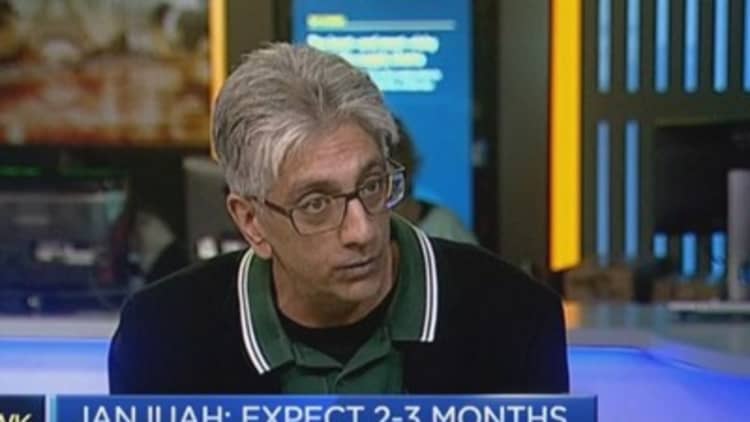
Rather than anticipating a rate hike by the U.S. Federal Reserve this year, Nomura's widely-watched strategist, Bob Janjuah, believes that the move could be postponed to late next year—and that more aggressive easing or "QE" could be on the way.
"If U.S consumption doesn't pick up then why the hell would the Fed raise rates?" the notoriously bearish Janjuah told CNBC International on Tuesday.
"I think (the second quarter of 2015) is critical. (The second quarter) is going to tell us about corporate earnings in the U.S."
U.S. consumer spending barely rose in February, according to the U.S. Commerce Department on Monday. The new figures showed a rise of 0.1 percent last month after dropping 0.2 percent in January, with consumer spending accounting for an average of about two-thirds of gross domestic product in the United States.
Hawkish members of the Fed like the St. Louis's James Bullard are keen for the central bank to edge the main interest rate higher, possibly as soon as June. Indeed, some economists see this as vital for curbing asset bubbles and injecting discipline into the market.
Read MoreFed's Bullard: Markets could have another 'tantrum'
Janjuah conceded that the Fed might look to hike rates marginally in order to gain a "buffer" to lower rates again during any future slowdown. However, he said it was "a bit late" to curb asset bubbles now and that the Fed was "storing up a big problem."
He added that without U.S. consumer demand bouncing back, another quantitative easing program from the Fed would be needed to battle the headwinds of deflation around the world.
"So far we're blaming (the first quarter's U.S. economic data) on the weather again. It's like the U.S. is the only place that has weather in (the first quarter)," he said.
"If (the second quarter) is as weak as (the first quarter), or doesn't show a significant improvement, we're going to price the Fed into late next year."
The Fed started aggressively expanding its balance sheet shortly after the global financial crash of 2008, in a program that became known as QE 1. After a short break, the Fed started a second program in 2010, before launching its third open-ended $85 billion-a-month program in late 2012.
This aggressive easing has now been dialed back and the Fed is widely expected to raise its main benchmark interest rate this year.
Janjuah is no stranger to gloomy predictions, and has made several bold calls in recent years—during which time the rose by over 12 percent.
Other analysts that are less bullish about the U.S. economy include those at Societe Generale. In a note on Tuesday morning, the French lender lowered its forecast for annualized quarterly U.S. GDP (gross domestic product) growth to 1.5 percent from 3.5 percent on a seasonally adjusted basis.


